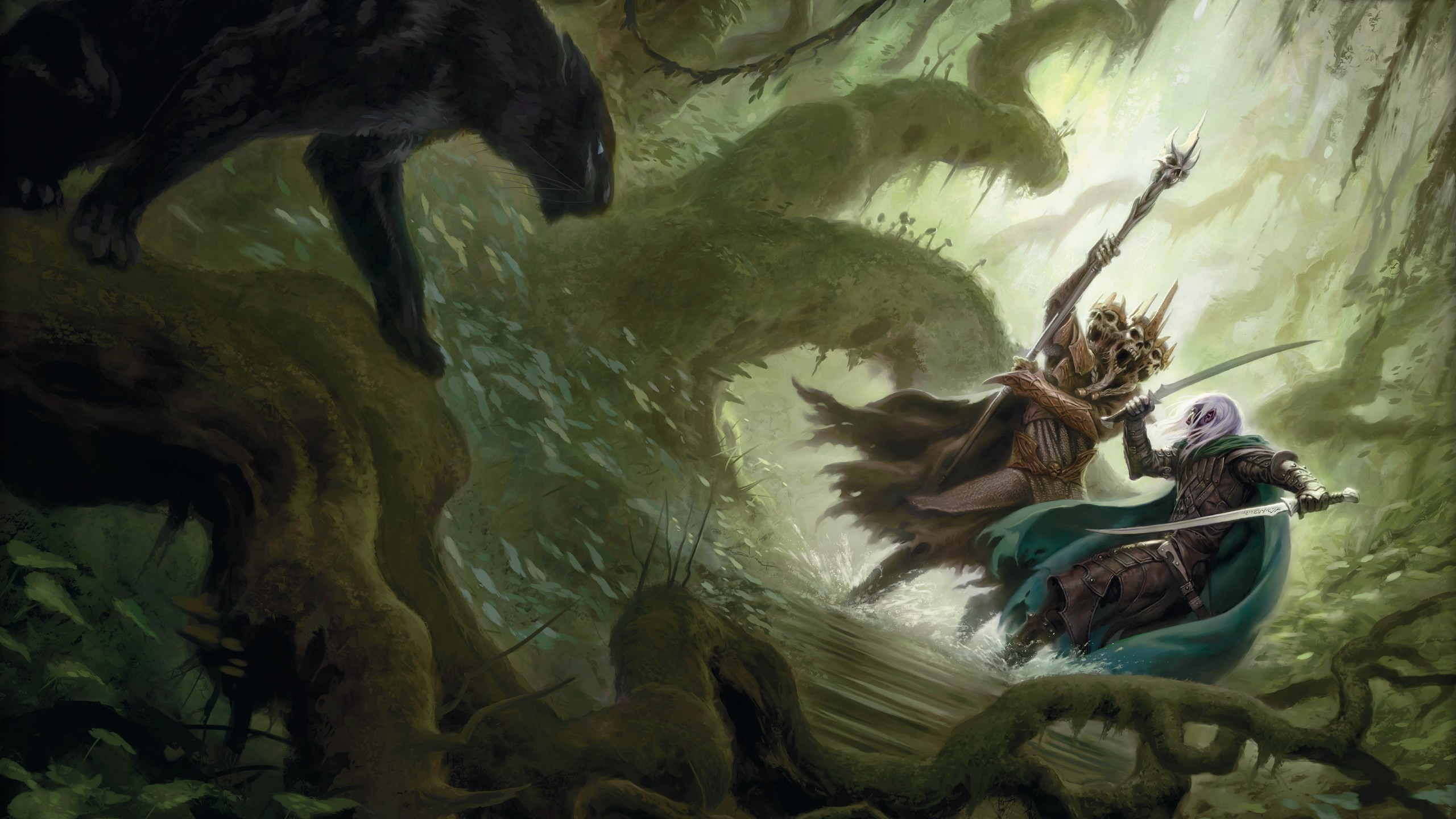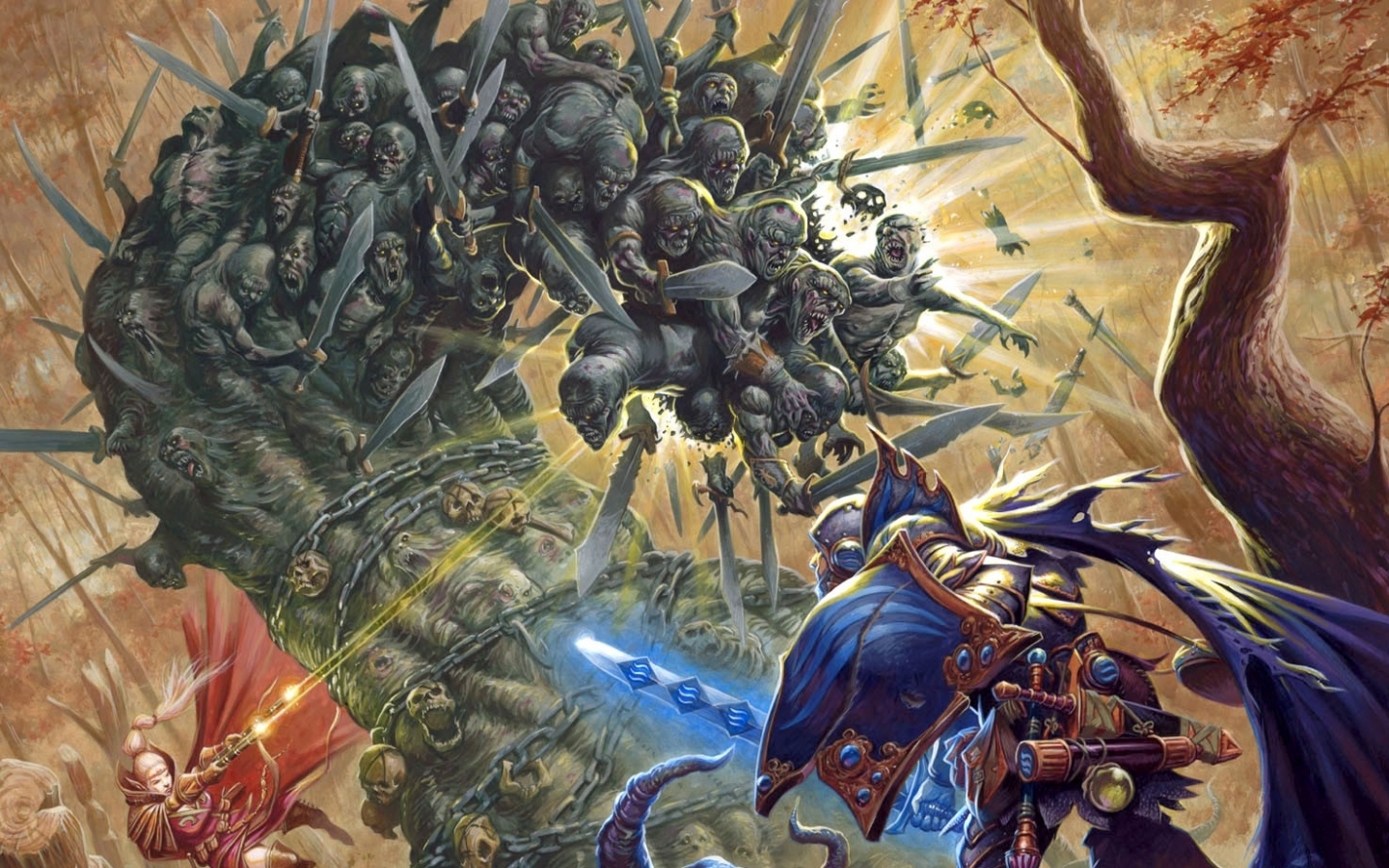The Ultimate Guide to Dungeons & Dragons: Part 1 - What is D&D?
- Posted on
- By Tristan Donaldson
- Posted in D&D, Dungeons and Dragons, Role Playing Games
- 0

Find out what Dungeons & Dragons is all about and why it's one of the most iconic tabletop games of all time.
What Is Dungeons & Dragons?
An Introduction to the Game
You’ll often hear “Dungeons & Dragons” described as a fantasy table-top role-playing game, but what does that actually mean?
Simply put, D&D is a game where each player creates a unique character who lives in a magical world, inhabited by fantasy creatures like elves, goblins, unicorns, and of course, dragons.
Another player, the “Dungeon Master” (DM for short), writes the story of that world and portrays everyone else who inhabits it. Together, a team of players, called a “party”, goes on adventures created by the DM using their characters’ skills and abilities to overcome various challenges along the way, such as fighting monsters or finding booby traps in a treasure-filled dungeon.

The many funky-looking dice are rolled to determine if a character passes or fails those challenges. Think of it as group storytelling with your friends, but with some rules to keep everyone consistent. The DM acts as the main storyteller, having created all of the characters and locations in the world, and also as a sort of referee who knows the rules and determines if characters’ actions makes sense or are even possible.
Because there isn’t a board, it’s not really a board game per se, but a “table-top” game, since everyone sits around a table as they play. However, you’ll frequently see battle maps on those tables with miniatures to represent the heroes and their enemies in combat, just so that everyone can visualize where they are in space.
The Main Elements of Dungeons & Dragons
D&D has broadly three main components: role-play, combat, and skills. Role-play is acting out how your character would behave in a given scenario. Because you can meet all kinds of people in this imaginary world, from whimsical wizards to fearsome dark lords, an important part of the game revolves around dramatic scenes between your hero and non-player characters (NPCs) portrayed by the DM, similar to a scene in a movie or TV show.
The fun part is, you get to choose your own character whose actions will determine the outcome of any scene and therefore, the grander story. You might need to befriend a local noble or intimidate a sneaky thief in order to get something that advances you and the party on your quest.
The second aspect, combat, is pretty self-explanatory. Every good adventure has baddies trying to stop you. The party fights as a team to defeat them and get closer to their goal.

Each character has a class which gives them special roles in both role-play and combat. Some characters fight with swords or axes to protect their party, others heal and give bonuses, some are sneaky and try to get a surprise attack, and others are physically weak, but can cast powerful spells. A good party will balance all of these roles throughout its players so that they can function better as a unit.
The last aspect is skills. These are different traits acquired through the characters’ professions, anything from history to animal handling. Skills really have to do with exploration in the game. On your adventures, you’ll encounter various problems that require knowledge instead of combat in order to overcome, such as broken bridges to be jumped or secret lore that your character might know. You’ll need to creatively use your skills in order to solve these problems, and continue on your journey.
Continuous Storytelling & Improvisation
Unlike typical games like monopoly where the game ends once you put away the board, the story in D&D continues after everyone has left the table. Like your favorite TV show, the plot resumes where it left off whenever the DM and players all gather to play again.
Usually, groups meet weekly to keep the story fresh in mind and the momentum going. This way, games can last for months or even years as the story continues to grow and progress.

Usually, stories are told in a series of adventures, known as a “campaign”. Throughout a campaign, the players will explore new parts of the world, and become more experienced and more famous as they complete each quest that they encounter.
Your first adventure might be as simple as saving a tiny village from bandits, while your last might be saving the entire kingdom. Of course, each campaign will vary in scope and scale, but leveling is a core part of the game.
Because the stories can be so investing, players will often think of ideas that the DM didn’t even consider. Therefore, a good DM will think on the fly and adapt the story as it goes. Perhaps the heroes save a king who was originally scripted to be murdered by the villain.
What happens then?
Do his enemies try again, but harder? Or does the party become the villain’s new target?
This game design makes the story something ever evolving and unpredictable, while simultaneously giving a lot of power to the players to decide their own destinies.
A Brief History of the Game
Although D&D’s popularity has exploded in the past ten years, the game has been around for almost half a century. Back in 1974, creators Gary Gygax and Dave Arneson created the very first iteration of the game. It was incredibly simplistic, with players simply walking through dungeons, fighting monsters, and getting treasure without a broader narrative.

However, by 1979, the “advanced” version of the game was born, and became the blueprint of all future editions. Every decade or so thereafter, the rulebooks got an update to fit with that generations’ sensibilities. The latest set is 5th edition, which most people play today. It has a lot of customization for characters, and is considered to be the most user-friendly, as it was designed to introduce new players to the game.
However, no matter which edition you play, the fundamentals of “Dungeons and Dragons” are always the same: Go on adventures, save the day, tell stories with your friends, and have fun.
Find out more in Part 2 - Why Play D&D? (And Not Something Else)

Comments
Be the first to comment...